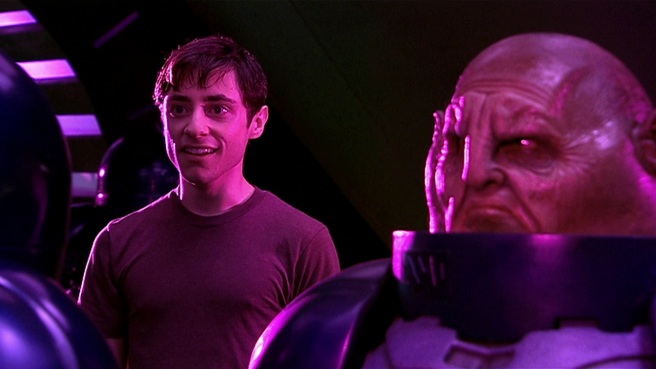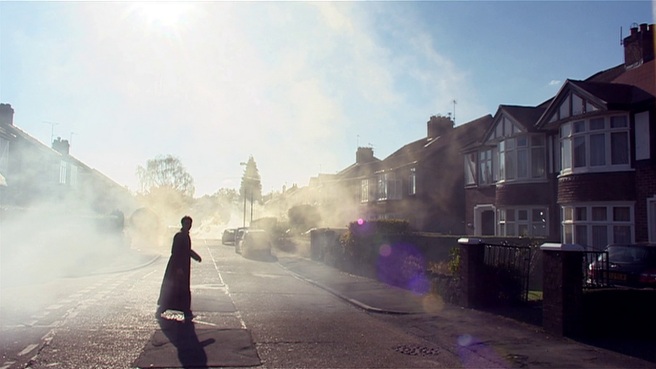You’re carrying a gun. I don’t like people with guns.
It is always a little difficult to write about these episodes. In part, the problem is derived from being the first part of a two-part story; there’s a certain degree of incompletion there, since it’s not the full story, which in turn makes it harder to write about the episode as a discrete piece.
Also, though, it’s the matter of the format and structure. The first two-parter of each of the Russell T Davies series, and the second two-parter from Moffat’s first series – written, perhaps notably, by Chris Chibnall, which is probably basis enough to speculate we might see them return in some form or another – tended to be what you can charitably call “broader episodes”. Less about big ideas than big set pieces, they’re rendered in sweeping brush strokes and aimed, generally speaking, at the younger audience members. It’s very much not a bad thing, or so I’d maintain; the monster two-parter has always got a bit of a lambasting. Not just from fans, who are going to be myopic and overly critical about most things; a quick google search for a review from 2008 described this episode, and previous years’ equivalents, as a “breakneck nosedive into abject embarrassment”. So, while I’ll generally always defend them for what they are, what they are is relatively simplistic television that can be difficult to write much about.
Still, though, that’s what you might call the received wisdom (and, actually, glancing through that review it strikes me as a fairly trashy piece, so we might not want to call it wisdom). It’s certainly something Russell T Davies always disagreed with – granted, he would, but when he contested the description that these were “just for kids” he might well have had a point. Looking back, you can see some clear satirical elements to Aliens of London/World War Three, I actually think that Daleks in Manhattan throws out some interesting ideas, and hopefully I’ll figure out something for Rise of the Cybermen before I publish this.
So, with this admittedly slightly tenuous premise now established in more words than are strictly needed, let’s consider: what’s going on in The Sontaran Stratagem, other than the bright colours and the returning monsters that look a little like potatoes?

What stood out to me as being – at the very least – interesting was the… I don’t want to call it a central conflict, because that suggests it has a bit more prominence than it actually did, so let’s say the tension between the Doctor and UNIT.
It makes a degree of sense, for the series in its post Time War state, that the Tenth Doctor is going to bristle when confronted with soldiers. In a wider sense, too, there’s an obvious tension lurking there – really, one that’s lurking in any UNIT story – because the Doctor so often finds himself working against armies in some respect or another. There’s a lot of ideas of authority and aggression tied up in there, which are often the traits you see the Doctor rebelling against; hence, then, the juxtaposition of UNIT with the Sontarans, who are the most exaggerated version of jingoism and brutality that you can get. Look at the two UNIT soldiers who come across Skor; look at the way the taller one, Private Harris, mocks and taunts Skor. It’s a vision of a very particular idea of the army – bullish and brash and filled with bravado, and ultimately also quite toxic. There’s something interesting about that, I think, given how you’d normally expect the alien fodder supporting cast to be written in such a way that they’re immediately sympathetic – it feels like an almost conscious attempt to get us to dislike him, and dislike the way he throws his weight around.
But look also at Martha and Luke Rattigan. Martha is now pretty much explicitly a soldier, and for all she talks about reforming the system from within, there’s a certain ugliness attached to it. (How else are you meant to read the line about “searching for illegal aliens”, before she starts questioning an Eastern European worker?) Similarly, there’s that great moment where Luke starts to join in with the Sontaran chant, imitating them and aspiring to be like them; it’s there that, suddenly, it makes sense why you emphasise the Sontarans as a clone race – because they’re all about conformity. That’s the big issue with the army, and in a sense you can see this almost as foreshadowing the problems we later see the Twelfth Doctor have with soldiers too.

Having said that, though, that opens up another angle of consideration. One of the big points of conflict between the Twelfth Doctor and Danny Pink was that, for all the Doctor’s disdain of soldiers, he treats them like he’s an officer. And you can see that here, because as soon as the Tenth Doctor is on site, he’s giving orders too – he fits right into the command structure, much as he insists he doesn’t. They draw attention to it, albeit as a joke, but it’s interesting to see how a lot of the ideas that are on display here crop up again during the show. I doubt that Steven Moffat was referring back to The Sontaran Stratagem consciously during the planning of Series 8, but it’s neat to see how the same character traits are preserved across the length of the series. Or, maybe not preserved exactly, but recur.
What’s also still interestingly relevant is Luke Rattigan (with two Ts), who feels very much the picture of some of the worst of society today – the entitled teenager, driven to violence because he feels isolated and lashes out. Even where the episode has dated, being built around satnav as it is, it’s still deeply topical in some ways. In a way, it’s kinda making me regret the way I approach these reviews; they’re all quite stream of consciousness, probably more accurately described as just a collation of thoughts than a proper review, written immediately following a single watch. I think if I were to approach this more studiously, there’s actually a lot to say about The Sontaran Stratagem – certainly, far more than I expected going in.
But, equally, yes. It’s weak in a lot of ways. For one thing, the incidental music really stood out quite poorly here; it’s often way too oversignified, hindering the episode rather than augmenting it. One particular moment that stands out is when the Doctor remarks that no one has told Luke Rattigan no in a very long time – David Tennant plays that line brilliantly, but the music blunts it entirely.
In the end, though, I liked it a lot – a lot more than I thought I would – and I’m looking forward to next week quite a bit.
7/10
Related:
